Time to Tackle the Hill
From the Winter 2025 Issue
Schweitzer has many programs to help
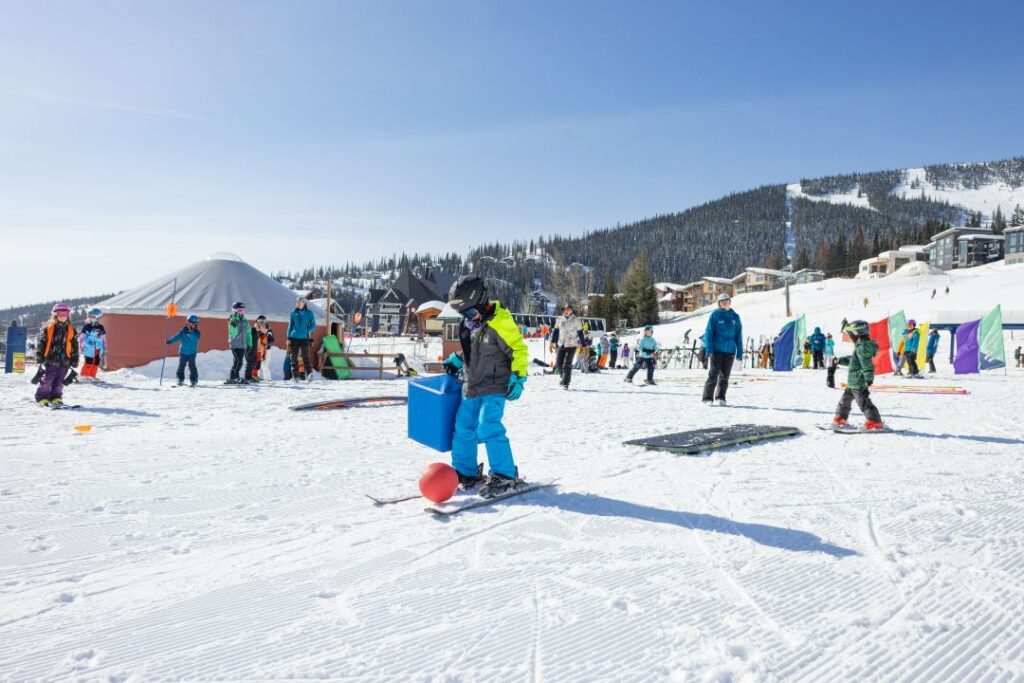
MANY KIDS ARE INTRODUCED TO SCHWEITZER AT THE RESORT’S SKI SCHOOL PROGRAMS. PHOTO COURTESY SCHWEITZER.
The costs for a day skiing or snowboarding are too much for many families. Here are ways to bring costs down.
Schweitzer had a big year in 2023. One of the Pacific Northwest’s biggest ski resorts not only celebrated 60 years of spinning chairlifts, but was also purchased by Alterra Mountain Company.
While the mountain can be bought and sold, locals and those who return to its slopes year after year—from all over the world—feel their own sense of ownership. And they commit large sums of money to pursue their passion on what is decidedly a mountain, but frequently called “The Hill.”
Yet the number of locals who never—or rarely—access Schweitzer’s 92 runs sometimes seems at odds with how quickly the powder can get shredded on a bluebird powder day (at least compared to five or 15 years ago). Cost is a primary reason proffered for not partaking of Schweitzer’s winter offerings. Skiing and snowboarding are expensive? No kidding.
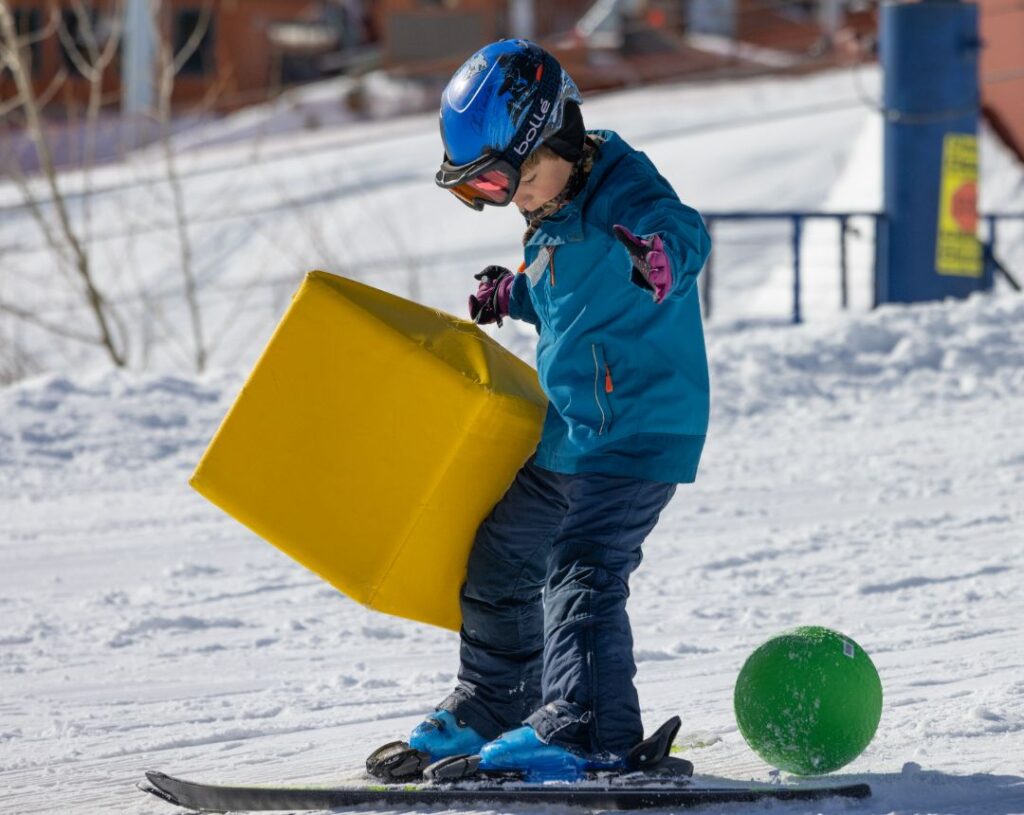
WITH YOUTH-FOCUSED PROGRAMS LIKE FUNATICS,MOUNTAIN XPLORERS, AND THE SKI IDAHO PEAK PASSPORT, AND PARTNERSHIPS WITH THE NORTH IDAHO MOUNTAIN SPORTS EDUCATION FUND AND LOCAL SCHOOL DISTRICTS, SCHWEITZER REMAINS COMMITTED TO GROWING THE SPORT.
A 2023 “Outside” magazine article reported that the cost of an unplanned day of skiing (including transportation, parking, lift tickets, gear rental, and lunch) for a family of four ranged from $813 to $1,341 at resorts across the country. Closer to home, that cost (based on 2023–’24 prices) is significantly cheaper: around $625 at Schweitzer, depending on one’s lunch choices. Surely that’s a bargain, but still, $625 for a day of fun in your backyard is a deal-breaker for many.
Fortunately, there are ways of reducing the cost of snow sliding, from working on the mountain, night skiing, and buying early season or multi-day passes, to brown bagging your meals, and being creative and strategic in purchasing equipment and apparel. Yet even employing some of these tactics, the sport remains out of reach for so many.
Schweitzer and several other groups and individuals have made improving access to skiing and riding a priority. Schweitzer’s Marketing Communications Manager, Taylor Prather, explained that the resort is fully committed to making skiing and snowboarding as accessible as possible, especially for youth. “I think from an accessibility standpoint, the great thing about Schweitzer is that we are the largest in both the state of Idaho and among our near neighbors in Washington, and we are very much still a business that’s grounded in our local community,” she said.
She added that the local ski community helps resort management stay focused on the core skiers who frequent the mountain. “The fact that families and kids, whether they’re visiting or live here, have the opportunities to come up through various programs is pretty unique and pretty special. We have all of these incredible youth programs that we support throughout the winter, helping kids get outside and access an awesome place that’s right in their backyard,” she noted.
Schweitzer’s Funatics and Mountain Xplorer programs provide season passes and weekly instruction at a discounted package rate. “Those run throughout the season, and they really help foster this development and love of the sport. They’re a perfect activity for kids on weekends,” Prather said.
The resort also sells multi-pack lift tickets that can be purchased pre-season for the best pricing and buying a season pass, especially pre-season, usually pays off with about a dozen days on the slopes. “The analogy I always like to use is walking up to an airline ticket counter and buying a ticket that day to fly out,” Prather said. “Preplanning is the industry standard, and we try to do our best to get that message out because those are always going to be the best deals.”
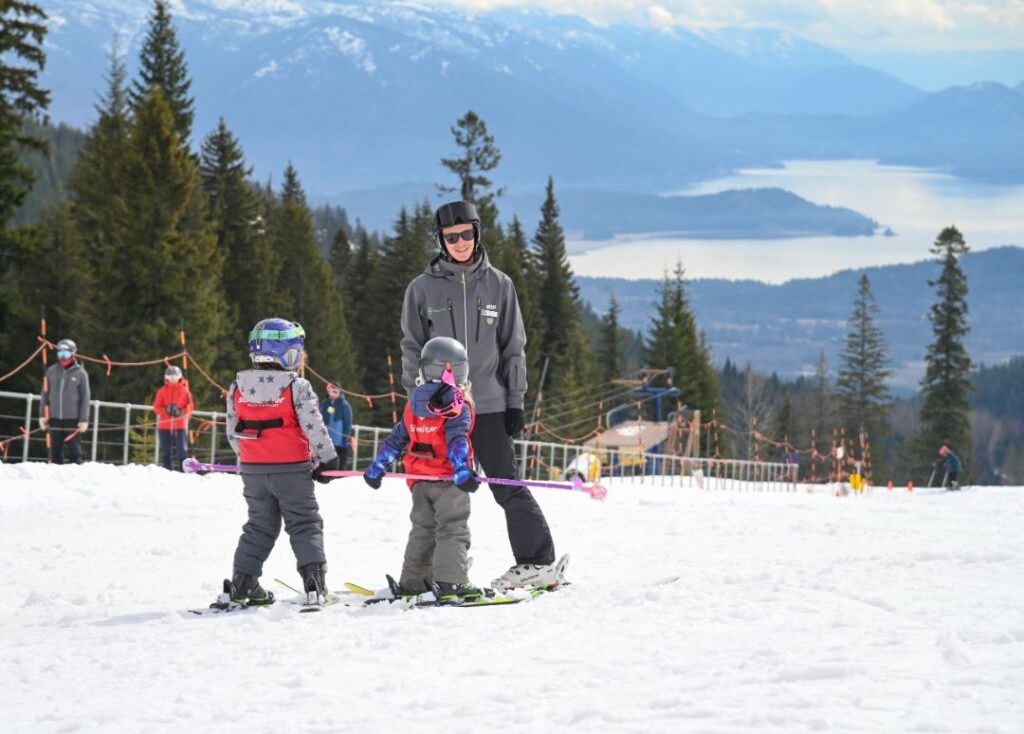
SCHWEITZER’S JUNIOR INSTRUCTOR PROGRAM GETS AREA YOUTH ON THE HILL AND EARNING THEIR PASSES (AND INCOME) WHILE LEARNING TO TEACH SKIING AND SNOWBOARDING.
Buying used or new gear off season and via annual ski swaps, including the Schweitzer Alpine Race School’s annual event, and one in Spokane, can deliver great gear well below retail costs. Also, season-long equipment rentals (like those available locally at the Alpine Shop) offer affordable options, especially for kids who outgrow their gear.
Additionally, Schweitzer offers a number of other programs and promotions designed to make getting on the hill more affordable:
- $20 Own the Night Twilight Lift Tickets (ski from 3 to 7 p.m. with $10 donated to local charitable partners)
- Afternoon lift tickets, a reduced rate for skiing noon to close, Sunday through Thursday
- Pre-purchasing online, and reloading RFID lift tickets also reduces the total cost
- The Ski Idaho Peak Passport program provides fifth and sixth graders with free lift tickets at Schweitzer and 16 other Idaho resorts for a nominal processing fee
- Partnerships with local school districts for midweek skiing programs
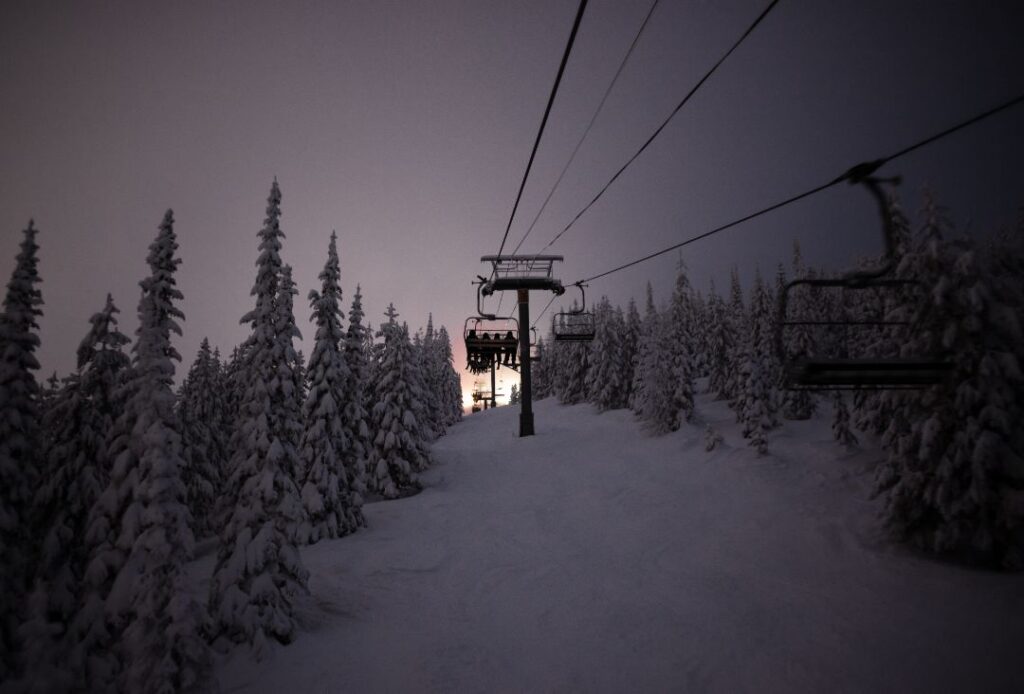
TWILIGHT SKI TICKETS ARE AN INEXPENSIVE WAY TO ACCESS THE MOUNTAIN. ALL PHOTOS COURTESY SCHWEITZER.
NIMSEF offers an assist for kids—and adaptive skiers as well
Operating with generous support from Schweitzer, the nonprofit North Idaho Mountain Sports Education Fund has evolved into a bit of a local institution. In 2010, long-time Schweitzer ski instructor Jeff Rouleau first conceived the idea of an organization focused on getting local kids onto the slopes because so many families he knew had two working parents but still couldn’t afford more than a day a year, and thus NIMSEF was born. Now, 15 years later, hundreds of scholarship skiers and snowboarders have benefited immensely from the efforts of Schweitzer, NIMSEF volunteers, and monetary donations from hundreds of individual and corporate donors.
NIMSEF has always required “some skin in the game” from its scholarship recipients (age 7 to 17) and acceptance is related to family income. Participants are required to sell raffle tickets for a Schweitzer season pass and are encouraged to earn money for the $50 fee ($100 for ages 16 to 17, and an increase of $50 per year for returning students) by raking leaves, babysitting, etc.
All scholarship students receive a full Schweitzer season pass and gear for the season, and students aged 7 to 14 are enrolled in Schweitzer’s Funatics program, which connects groups of similar age and ability who spend eight weeks together exploring the mountain with an instructor. NIMSEF has served as the impetus for several youth to transition into becoming junior and certified instructors, and for some to start their own successful businesses.
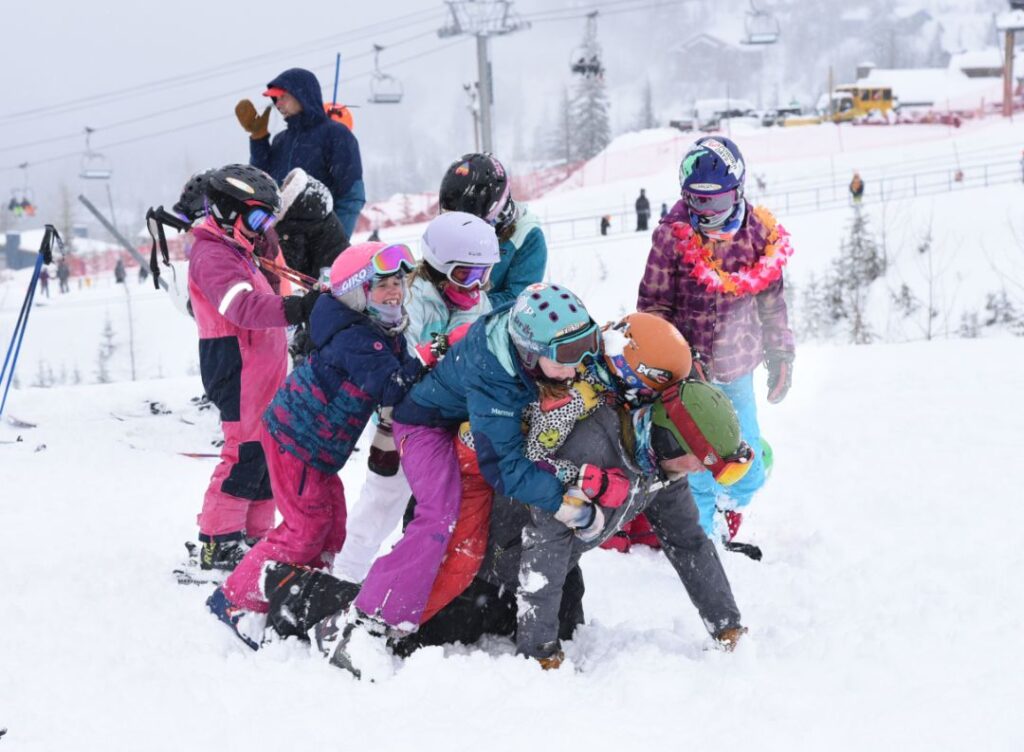
FUNATICS IS JUST AS MUCH FUN AS IT SOUNDS LIKE. PHOTO COURTESY SCHWEITZER.
NIMSEF also works to support U.S. military veterans who don’t have the means to get out on Schweitzer’s slopes. On a case-by-case basis, the organization attempts to meet requests for equipment rentals and lift tickets.
Additionally, the nonprofit works closely with Schweitzer to help get disabled skiers on the slopes. The adaptive program provides a full spectrum of adaptive skiing and boarding lessons along with one-on-one instruction with Professional Ski Instructors of America adaptive-certified instructors. Schweitzer also offers a complementary ticket for the disabled skier’s guide when necessary.
Jade Smith, Schweitzer’s resort service director, said that striving to provide access for all to the mountain is an ongoing priority. “I think as we further integrate into Alterra’s systems and processes, we’re going to find more resources to help promote adaptive access to the mountain. It’s something that we’re looking forward to developing in the future,” he said.
All Schweitzer lift operators receive training for loading disabled skiers onto lifts, and the village area features heated sidewalks that help ease entry to the area. Additionally, last year the handicapped parking lot on the base area elevation nearly doubled.
In keeping with the commitment to supporting the disabled ski community, this year Schweitzer is also sponsoring six Special Olympics athletes from Boundary County. Three adaptive skiers and three snowboarders will receive six lessons throughout the season, which will qualify them to be eligible for the Special Olympics Winter Games.
Going forward
As the area’s demographics change and the financial pressures on local working families increase, Schweitzer and locals remain committed to building the ski and snowboard community and allowing those who face challenges to getting on the hill to overcome them. Having relocated to the area from a major Colorado ski resort, Prather has a unique perspective on Schweitzer and its relative affordability.
“Comparatively, apples to apples, it’s really unique to have a world-class resort that can still be affordable and accessible for a local family to just have an unplanned day at the mountain,” she said. While the hill is now part of a large corporation that owns some of the industry’s most notable names, staying grounded in grassroots support remains a priority, according to Smith.
Speaking from the perspective of working in multiple roles on the hill over the last 30 years, Rouleau said that while change is inevitable, it’s crucial for locals to stay engaged. “The financial challenges of living here have only gotten more difficult in the last few years and that’s not going to change,” he said. “Our goal is doing what we can to help the entire community be able to experience the amazing mountain that’s in our backyard.”



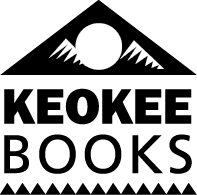
Leave a comment